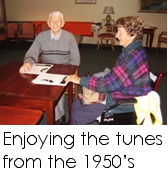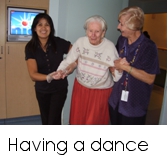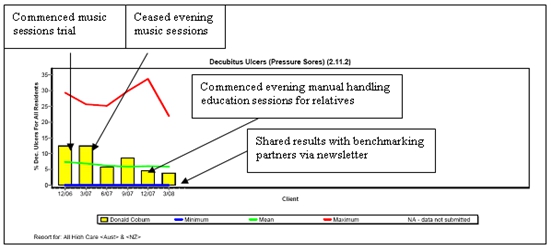You Can't Stop the Music
You Can't Stop the Music at the Donald Coburn Centre
The Donald Coburn Centre is a 180 place high care facility located at Castle Hill in the North West of Sydney. It is owned and operated by the Anglican Retirement Village group and has been benchmarking its clinical outcomes with QPS for over 18 months.When the facility first commenced benchmarking clinical indicators its rate of pressure areas was approximately twice the national average and already under review by local management. It was considered that appropriate policies and education had by and large been put in place but with an average RCS of 1.5 the facility had a large number of very frail residents and this put pressure on staff in the area of clinical care and management. In such a large facility and with so many competing areas of care. It was felt that something was required to stimulate activity in the area of pressure care management.

The suggested solution was to play music every three hours to remind staff and residents that it was time to "take the pressure off" At first the music was played during the day commencing at 10.30am and going right through into the evening shift. However residents found the evening routine to be disturbing and the music sessions were restricted to the daytime slots of 10.30, 1.30 and 4.30. Even so, the hours are to a degree flexible so that daily or special activities such as church are not interrupted.
In implementing the strategy, Care Manager Marie Pearsall and Workplace Trainer, Rolinda Reynolds explained that it was important to educate both staff and residents prior to commencement. The roles of individual staff members and the expectations of residents were clearly described to one and all.

There have been some intriguing and positive by-products of the program. For instance relatives have taken increasing interest in helping with the manual handling and movement of the residents. So much so, that many relatives have asked for instruction on how to properly handle their family members. This has now resulted in the facility running manual handling training courses for the relatives and friends of residents. There is an evening course currently running for 6 weeks for 12 relatives and is considered an important initiative.
It has been noticed that the music routine has become so popular that if the music is running a little bit late some residents will spontaneously start to move about or comment that the music has not come on. This evidence adds weight to the fact that simple strategies are sometimes the most effective.
Success of the music strategy is reflected in the decreasing pressure area rate over the past 12 months.

0 comments